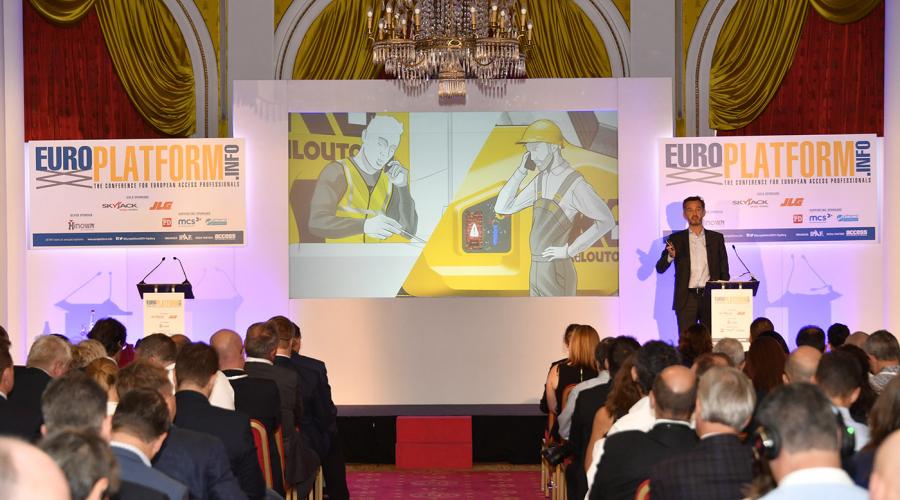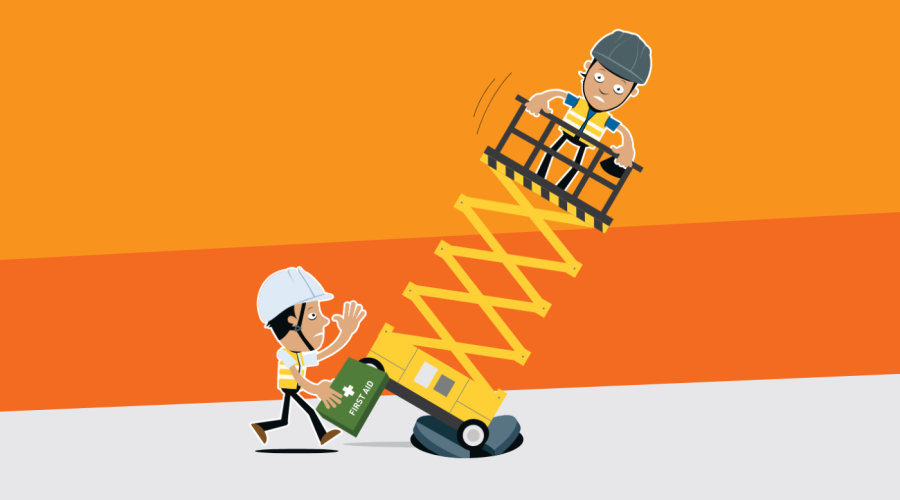Technology will aid people not replace them, Europlatform hears

Technological advancements in the powered access industry will enhance safety and efficiency and aid people in their work, rather than replace people altogether, according to the speakers at the Europlatform 2019 conference hosted by the International Powered Access Federation (IPAF), at Le Negresco Hotel in Nice, France.
Andy Studdert, Interim IPAF CEO and MD, opened the conference, attended by around 120 delegates, by reminding business leaders that people always come first. “In a year and a half, 75% of all companies will be using some kind of AI to improve their business processes,” he said. “As we move through the next few years using more and more new technology, what we must not forget is our people. Take care of your people first, and your technology will be adopted faster.”
This sentiment was echoed by Olivier Colleau, CEO of France-based rental company Kiloutou, who told the delegates: “How will technology impact MEWP Rental? It already is. We can track the machine, know whether it is switched on, and in future we can even roboticise and automate machine use.
“But my strong conviction is that technology will develop to help our people, our customers. In our business, technology and people get along very well. At Kiloutou, we use technology to protect people – all our machines have systems to prevent overload and tilt alarms. Technology also helps improve equipment maintenance or customer assistance using a smartphone on site, either calling technical helpline or signalling an issue via the app,” he added.
“We use BIM models of all our machines to help people plan better, but the machines cannot work by themselves. Technology will change the way we do business, providing new services to customers and helping people do their jobs and add value to what they do. It won’t be quick to implement and requires experimentation to get right, but by collaborating and sharing data we will all share the benefits.”
Clotilde Jouette, Director of Marketing & Digital Business Transformation at Avesco Rent, was next on stage to talk about how the biggest benefit of digitisation is in allowing business owners to make decisions based on more information. “There is a shift towards the social and environmental impacts of our companies and how we do business. It is proven that rental is better than buying equipment,” she said.
“I completely agree with the previous speakers that our workforce is our most important asset, and this is why we value them and ensure they are properly trained. Technology adds value, but where do we start? It can be the biggest differentiator, but can require a paradigm shift, and changes the whole ecosystem of our customer relationships. AI can combine multiple systems to automate data gathering and analysis.”
Valery Klimenko, Regional Managing Director of Fortrent and President of the Russian National Rental Association, gave a fascinating and detailed overview of the Russian MEWP rental market, which has grown steadily since the 1990s and is currently being fuelled by development, particularly in eastern and northern territories.
He explained how market penetration is still low when compared to the rest of Europe, but was optimistic there are “good opportunities for market development”, despite some obstacles in the form of import tariffs on US-made machines. “This negatively affects the user when they can’t get the machines they need.”
The growth picture in the rest of Europe by comparison may be stable, but it is restricted by global trade tensions and Brexit uncertainty, said Audrey Courant of DuckerFrontier, which produces IPAF’s Global Powered Access Rental Market Report.
Among the ways European MEWP rental businesses can still thrive and maximise opportunities for growth are tapping into the circular economy, she added, engaging with digitisation and moving from a simple product delivery model to become a safety solution provider, echoing Clotilde Jouette’s idea of building customer “ecosystems” to better identify demand and provide full-service support.
Jim Colvin, CEO of Serious Labs, talked about how his company is working with IPAF and others to translate MEWP operator training, familiarisation and competency testing into the virtual reality (VR) simulator environment: “The customer is looking for you to solve their problem,” he said. “Technology’s a tool to help deliver that, and the data that is realised from that will also be incredibly valuable. When we ask the right questions of that data, we will start to make decisions that are predictive rather than reactive.”
The afternoon session began with Angus Kennard, CEO of Kennards Hire in Australia, talking about how telematics was helping equipment hire companies create an “ecosystem” to service customer demand. He talked about that while his company has grown strongly since the early 1990s, that customer service excellence is what Kennard Hire strives for, seeking to be the “best rental company in the world”.
He explained MEWP telemetry was just part of the global interconnected internet of things (IoT), and what is driving its uptake at a business level. Improved utilisation rates is a clear benefit, but like other speakers he pointed out that there are many different systems and telemetry products in the market, different asset types of varying levels of sophistication and age, and the question again was “where to begin?”
He said his company focused on identifying what the customer wanted from telemetry, and it’s “much more about just knowing where the machines are”. Customers on large, complex, multidisciplinary contract sites need clear metrics to cover the whole site, all assets and tasks, which led Kennards Hire to develop its own IoT platform, EasyTRAK.
The successful implementation of this system has allowed Kennards Hire to better service customer demand, be predictive about what equipment will be needed where and when, and to be more proactive when deciding what machines to invest in next.
The afternoon panel debate featured a selection of the conference speakers considering questions about how to enhance customer service by application of digital technology without “taking the human interaction out of the equation”, in session host Andy Studdert’s words.
There was agreement that new technology of any kind should only be used to enhance employee effectiveness and allow the person in the equation to focus on the things that matter. Angus Kennard and Clotilde Jouette also agreed that intelligent use of data was about adding to the range of customer options for interaction, and caters more widely to different generations of end user who are used to doing business in different ways.
All agreed that the Internet of Things, digitisation and intelligent use of big data were all huge opportunities but that these were not without their challenges, and there is a definite sense that the industry is lagging behind on some issues, not least on legislation and best practice around data ownership and sharing.
Ivan Papell, CEO & Owner of Liftisa and MovingRent, talked about how to evolve in the rental business by creating, growing, selling companies and starting the process all over again. Profitability should never be the aim, he said, and when creating a business he believes you should set other goals. He also stressed the importance of the industry as a whole of driving up standards of safety and adding value to customers, chiming with the majority of the other speakers on the day.
The conference closed with a presentation by Andrew Delahunt, IPAF’s Director of Technical & Safety, on the forthcoming publication of the IPAF Safety Report. This is based on analysis of data gathered in IPAF’s accident reporting project. All the data IPAF collects is anonymous and confidential, with all identifiable information deleted. The analysis shows that accidents when using powered access are relatively uncommon, considering there are nearly 1.5 million MEWPs in rental fleets worldwide.
A snapshot of accidents from France, the Netherlands, Argentina and the US was presented, highlighting that the causes are recurring and preventable. More countries than ever before are reporting and this data is used to inform the industry, via IPAF’s safety campaigns and technical guidance. As part of the ongoing drive to get more companies in more territories reporting accidents and near-misses, IPAF will relaunch its global reporting portal, optimised for web and mobile devices, by the end of 2019.
